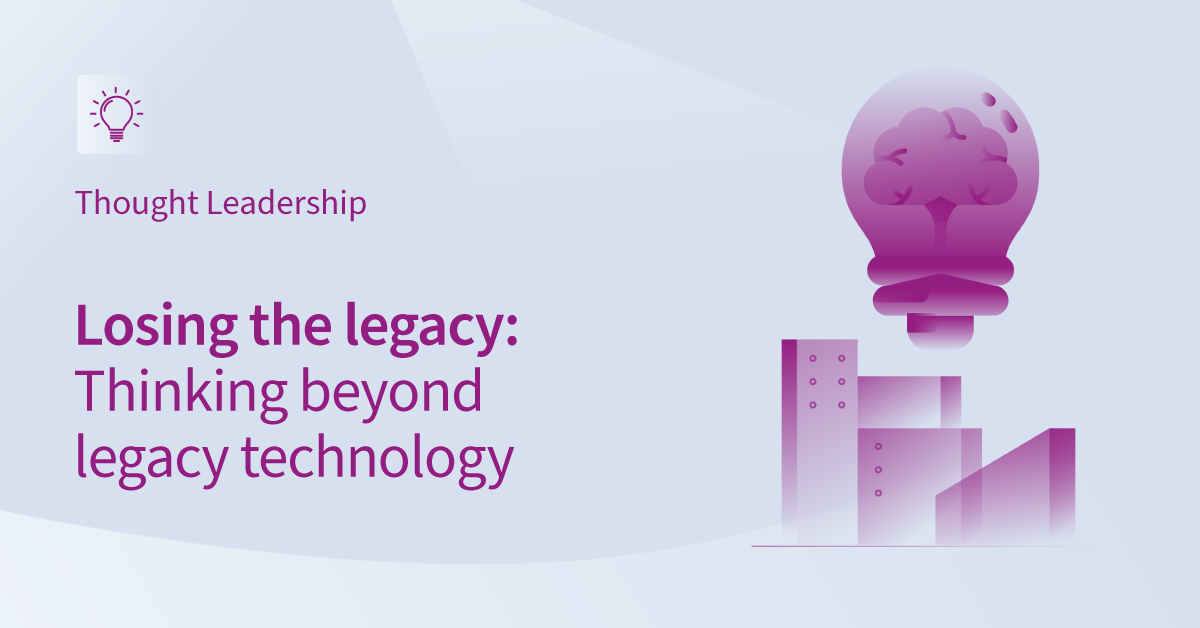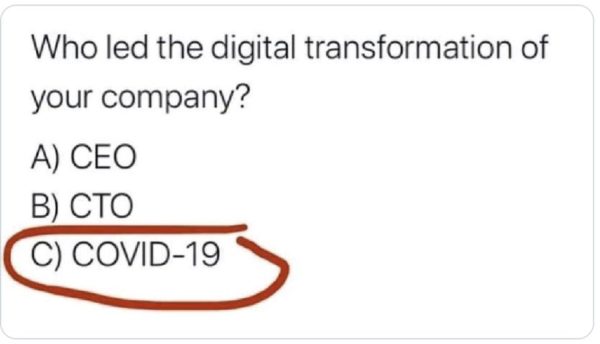Losing the legacy: Thinking beyond legacy technology

Getting serious about the technology stack
Legacy infrastructure has been the bane of large organisations for a long time, but the COVID-19 pandemic has amplified the conversation around technological transformation. This meme sums things up perfectly:

(Source Forbes)
Jokes aside, it’s clear this is a pivotal moment in digital transformation and digital acceleration, one that financial services organisations must embrace if they are to remain relevant and competitive.
Strong foundations
COVID-19 has been massively disruptive, but companies have (by and large) weathered the storm. As policymakers chart a course out of the crisis through mass vaccination programmes, so too business leaders will start to look to the post-COVID future. And that future is powered by data.
Accenture has recently released its tech trends for 2021 and it comes as no surprise that “stacking strategically” is a major trend. The AI-powered organisation isn’t an abstract vision; it’s something that must be built, brick by brick, by forward-thinking leaders who are willing to embrace the importance of strong foundations when it comes to data architecture. Indeed, a recent survey by Accenture found that 77% of executives believe tech architecture is becoming very critical or critical to the overall success of the organisation.
Our mission at Mudano is to build the future of financial services, underpinned by data and machine learning. We’ve long been advocates of good data architecture – from cloud data migration, to establishing long-term focused data strategies, to data literacy.
So often large organisations are trapped in ‘stack think’ – so overly concerned by legacy infrastructures that they cannot think beyond them, or else only a single step in front of them which is not big enough thinking to revolutionary reinvent an entire industry.
There are, howerver, foundational upgrades to the stack that can help organisations begin a data-driven reinvention journey.
Beyond technology
When we talk about the stack, we tend to think about technological infrastructure – information in the cloud, combined with data management and governance to allow for trust in data that drives value generation today, while setting a platform to allow for automated growth. We also think about experimentation and the way data is disseminated across an organisation.
But it should be emphasised that your stack isn’t only composed of technology. It involves a holistic recognition of the role that people play in getting the best out of technology and data. That’s why we’re careful to describe ourselves as a data consultancy focused on innovation and culture change. In other words – organisations will never be able to capture the true value of data if their organisational structures if their people are not geared towards making the most of this change.
Data Talent is a critical part of this. The right people can enable the business through data literacy and advocacy. This facilitates the construction of a data-enabled culture so that innovation can come from anywhere, and people don’t get trapped in tooling. Indeed, 86% of executives agree they must train their people to think like technologists – to use and customize technology solutions at the individual level, but without highly technical skills.
The opportunity
The AI-powered company of the future is one that enables a hyper-personalised, purpose-led agenda. It means AI being baked into business capabilities, powered by a platform that enables potential, and culture that knows how to use it. This is not ‘stack upgrade’ but rather thinking beyond an immediate improvement cycle. In the current climate, staying ahead of the pack is tantamount to standing still.
Rudyard Kipling said that, “If you don’t get what you want, it’s a sign either that you did not seriously want it, or that you tried to bargain over the price.”
To pursue the long-term goal of digital transformation, organisations must “pay the price” and go through the hard miles, to transform mentalities and business models to reinvent themselves in a new data-driven paradigm.
COVID-19 has amplified the conversation around digital transformation, and leaders are responding. There is a generational opportunity for financial services businesses to “lose the legacy” and strategically develop their technology stacks beyond the next step. A data-driven future demands it.